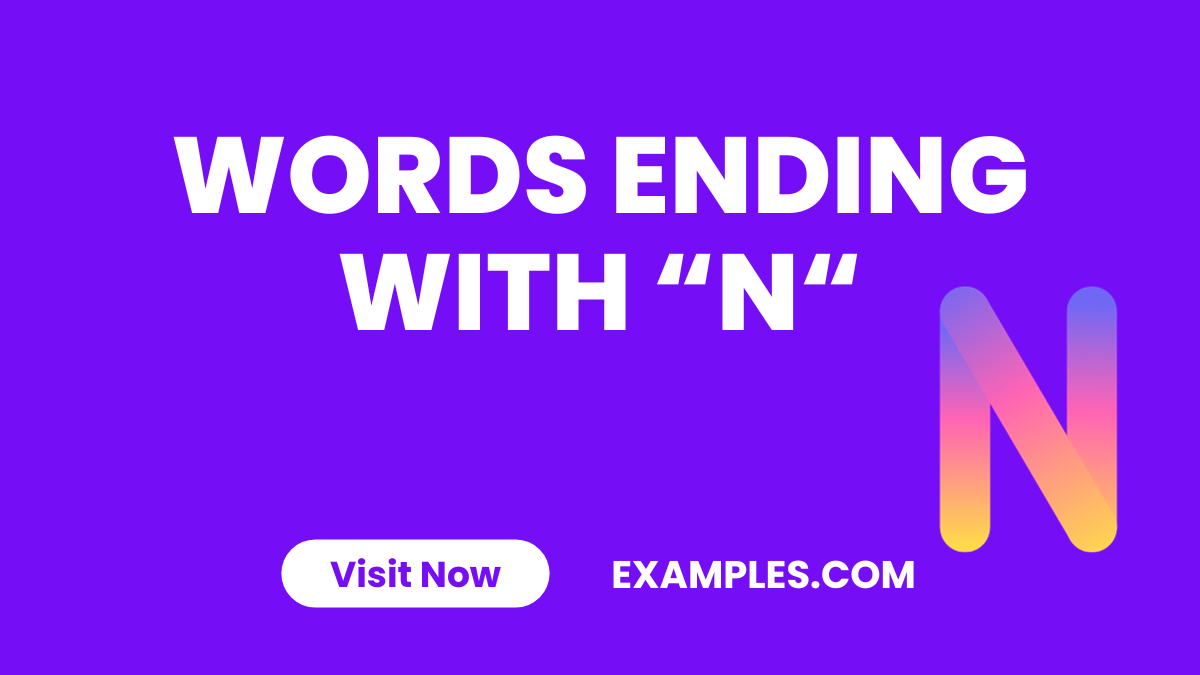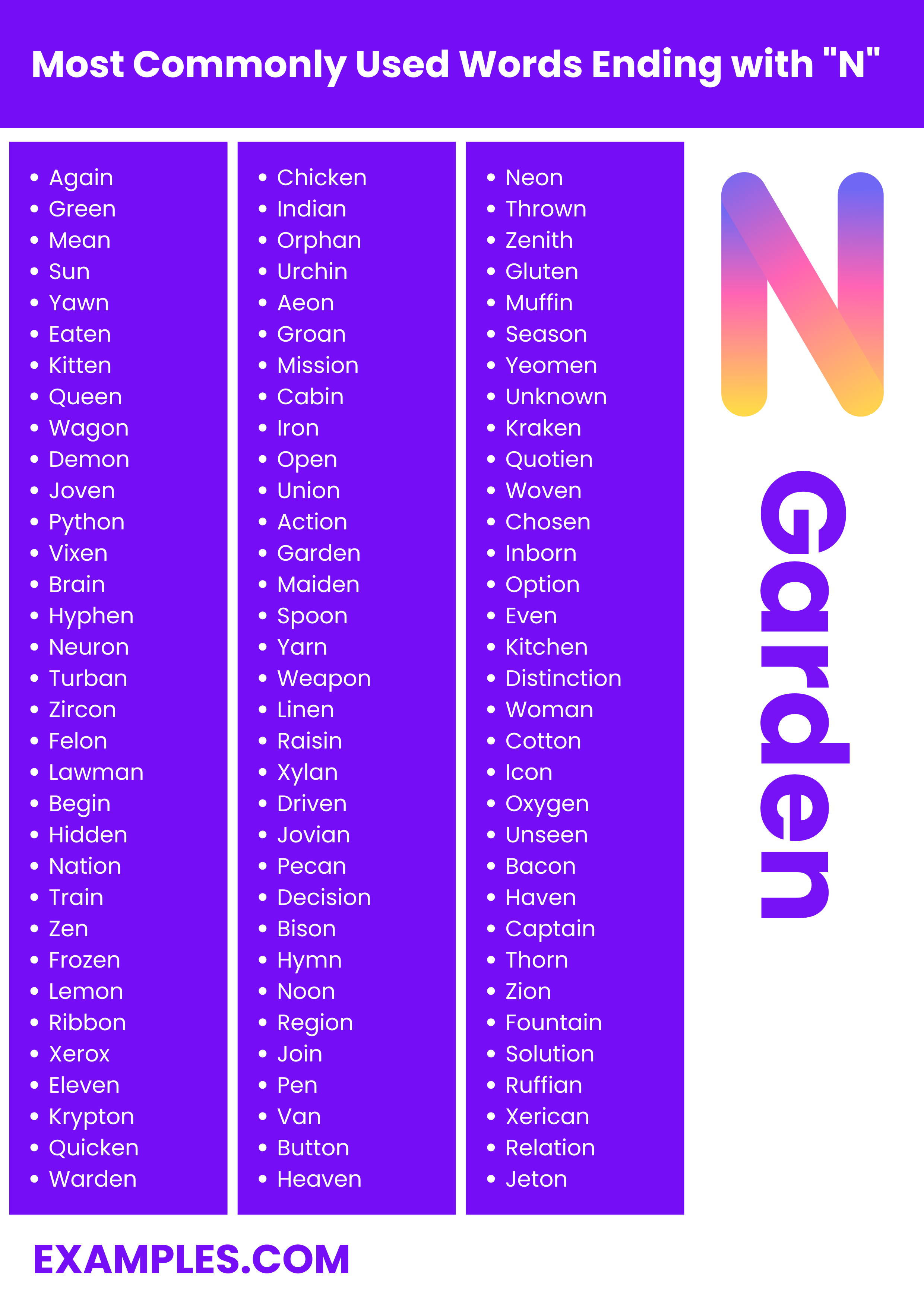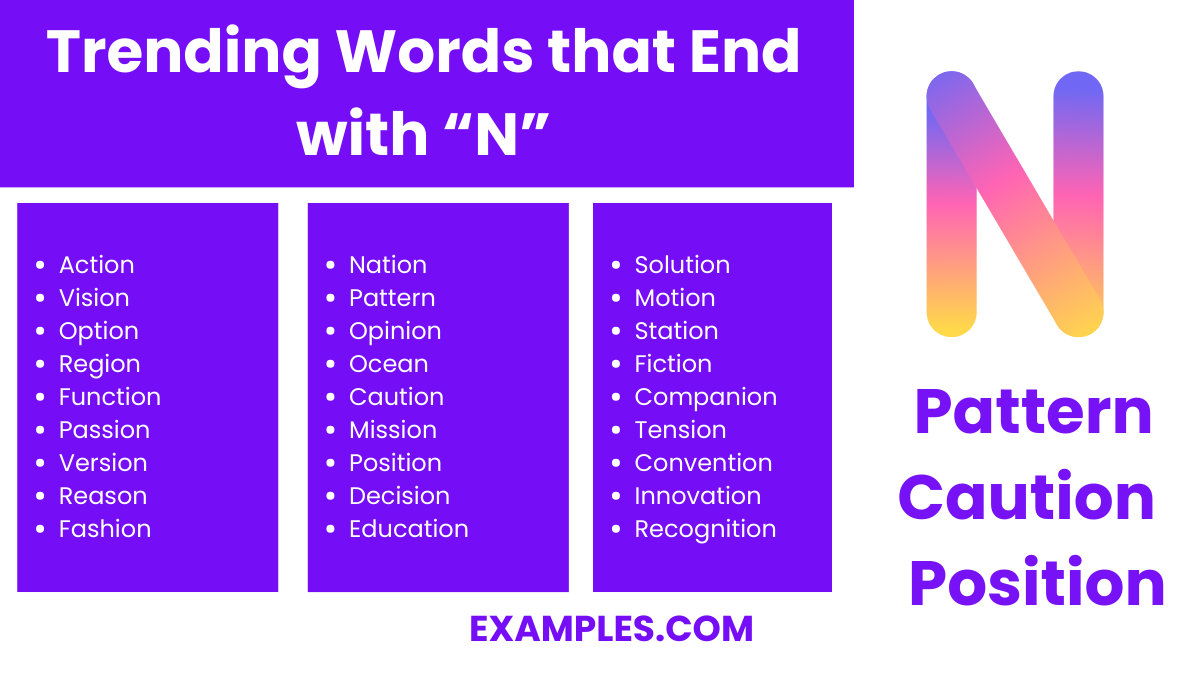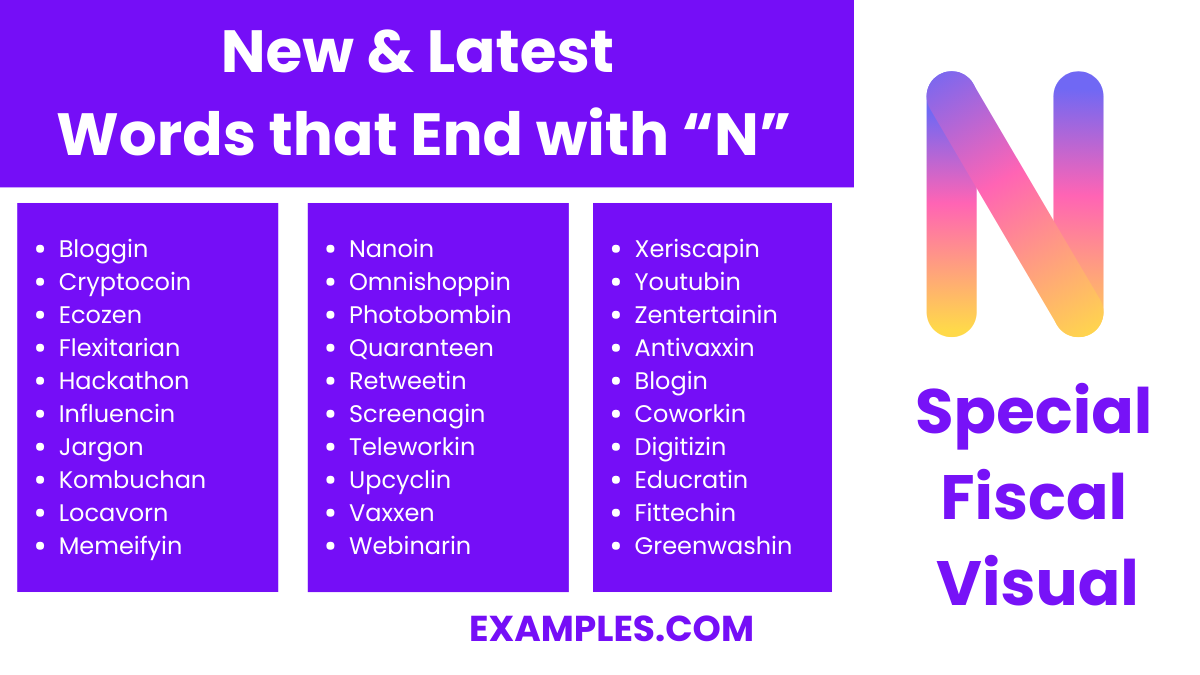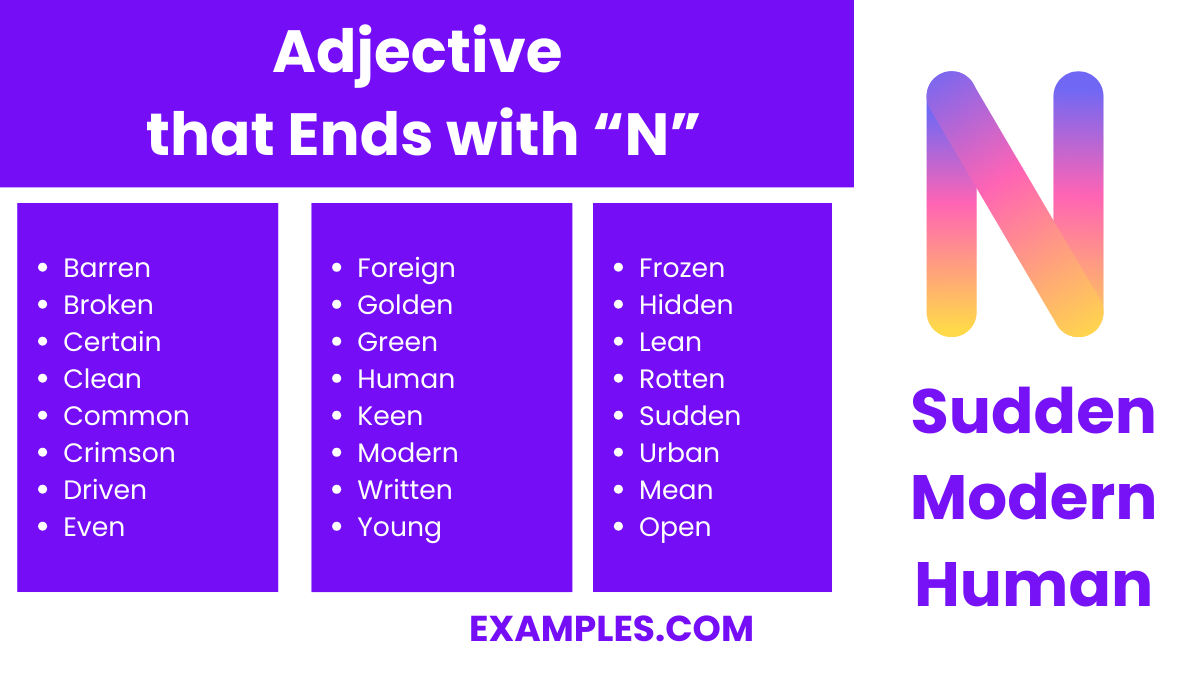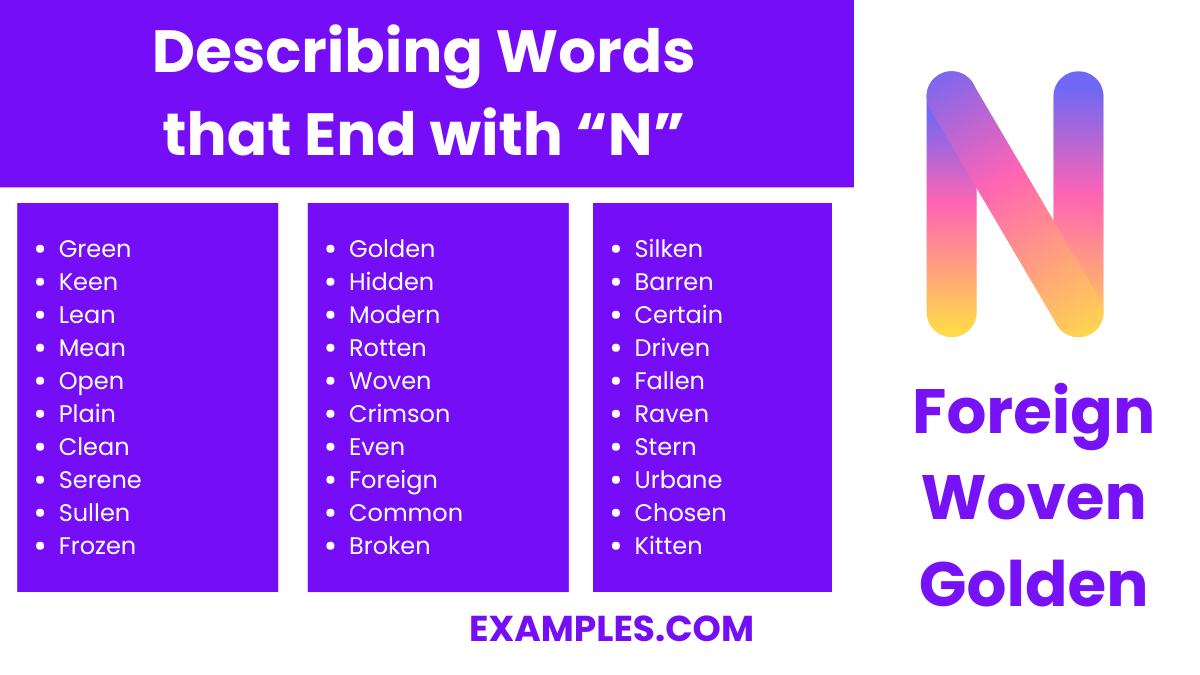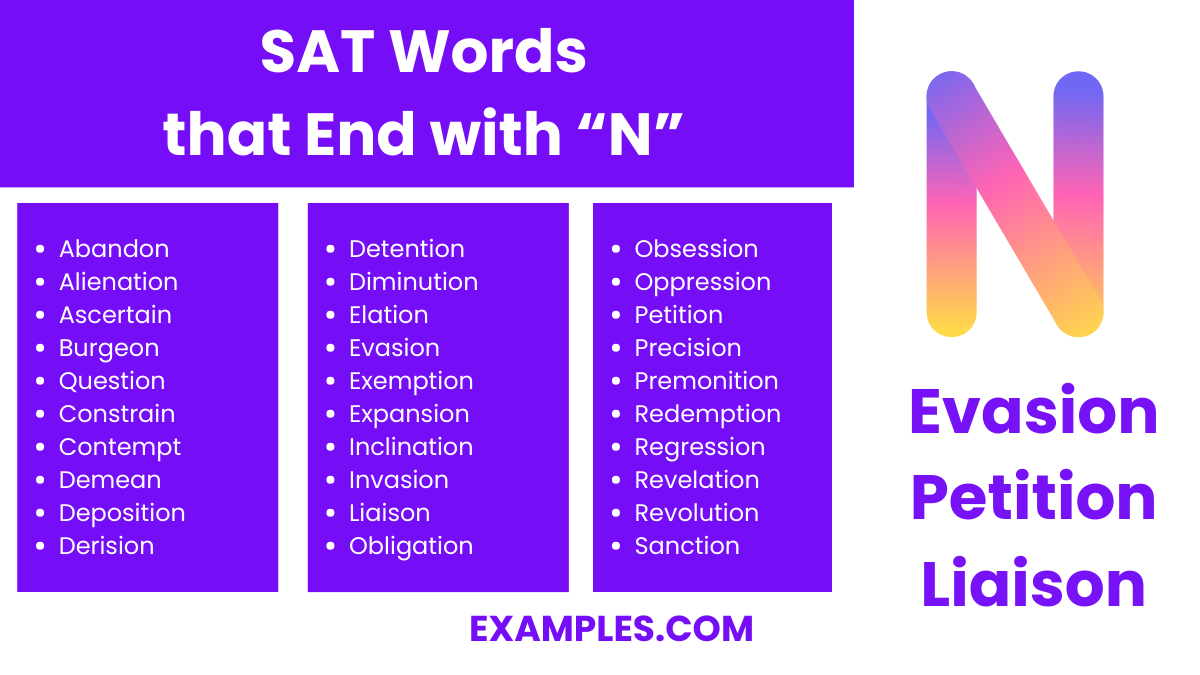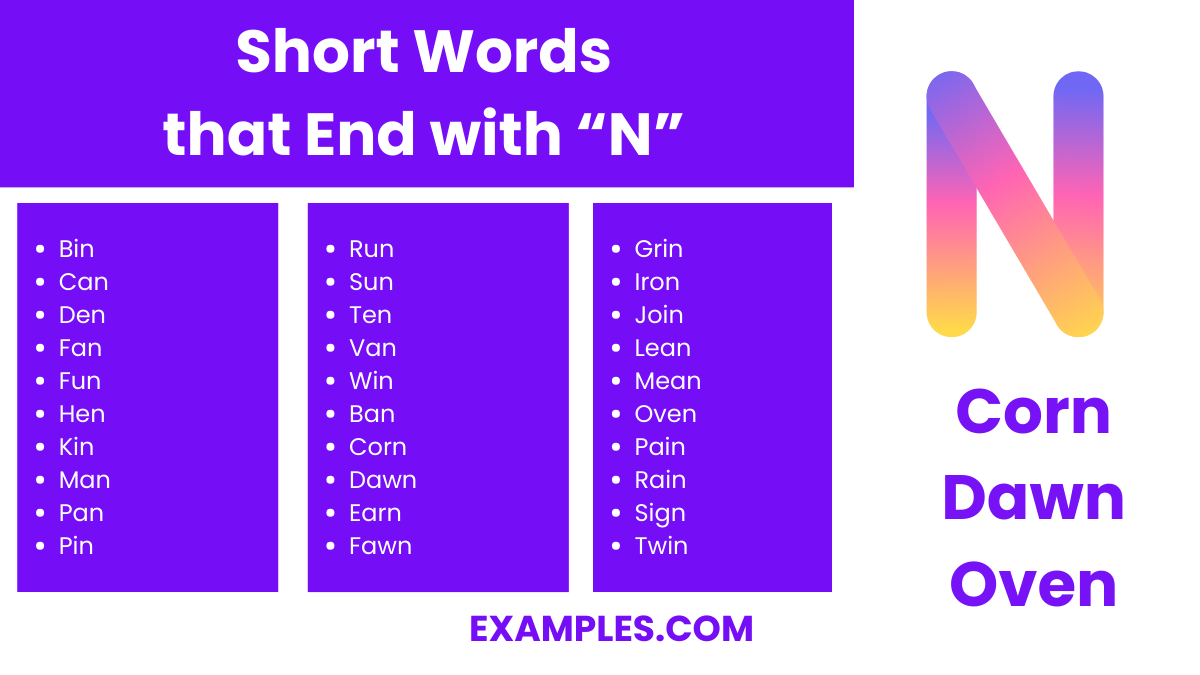150+ Words Ending With N List, Meaning, PDF
Words ending in ‘N’ unveils a treasure trove of linguistic gems, pivotal for English language mastery. As educators, our mission extends beyond mere teaching to empowering students with robust communication tools. The ‘N’ words ending, spanning various parts of speech, play a crucial role in enriching students’ verbal and written repertoire. This guide aims to demystify these words, presenting them in an engaging and accessible manner. Tailored for educators, it offers practical insights, diverse examples, and innovative strategies to enhance teaching outcomes. Embracing this resource equips teachers to ignite a passion for language among students, paving their way to linguistic excellence and confident self-expression.
Download Most Commonly Used Words Ending with N - PDF
150 Most Commonly Used Words Ending with “N”
Delving into the intricacies of the English language, one fascinating aspect is the abundance of words ending in “N”. These words form a significant part of our daily vocabulary, offering a wide range of expressions and meanings. For teachers and educators, understanding and teaching these words is vital for developing students’ language skills. The versatility of these words spans various parts of speech, including nouns, verbs, adjectives, and adverbs, enriching both spoken and written communication. To aid in this educational journey, here is a comprehensive table of 150 commonly used words ending in “N”. This collection is specially curated to enhance the vocabulary of students, making them more adept in their linguistic abilities.
| Again | Begin | Cabin | Region | Even | Fallen |
| Green | Hidden | Iron | Join | Kitchen | Lengthen |
| Mean | Nation | Open | Pen | Distinction | Reason |
| Sun | Train | Union | Van | Woman | Xylophon |
| Yawn | Zen | Action | Button | Cotton | Dragon |
| Eaten | Frozen | Garden | Heaven | Icon | Jargon |
| Kitten | Lemon | Maiden | Neon | Oxygen | Pigeon |
| Queen | Ribbon | Spoon | Thrown | Unseen | Vision |
| Wagon | Xerox | Yarn | Zenith | Bacon | Citizen |
| Demon | Eleven | Weapon | Gluten | Haven | Inven |
| Joven | Krypton | Linen | Muffin | Captain | Opinion |
| Python | Quicken | Raisin | Season | Thorn | Unicorn |
| Vixen | Warden | Xylan | Yeomen | Zion | Alien |
| Brain | Chicken | Driven | Unknown | Fountain | Given |
| Hyphen | Indian | Jovian | Kraken | Solution | Mountain |
| Neuron | Orphan | Pecan | Quotien | Ruffian | Silicon |
| Turban | Urchin | Decision | Woven | Xerican | Question |
| Zircon | Aeon | Bison | Chosen | Relation | Eon |
| Felon | Groan | Hymn | Inborn | Jeton | Happen |
| Lawman | Mission | Noon | Option | Pylon | Quillon |
Most Trending Words that End with “N”
In the ever-changing educational environment, keeping pace with the latest vocabulary trends is essential. For educators dedicated to enhancing their students’ language capabilities, delving into words ending in ‘N’ offers a unique advantage. These words, frequently encountered in contemporary dialogue and texts, are integral for grasping modern nuances and themes. Integrating this set of words into educational frameworks not only diversifies students’ vocabulary but also deepens their engagement with current linguistic shifts. This compilation of 30 ‘N’-ending trending words, complete with definitions, serves as a practical tool for students to navigate and resonate with the evolving language landscape, incorporating Daily Use English Words for practical application and understanding singular & plural words for grammatical versatility.
- Action – The process of doing something to achieve an aim.
- Vision – The ability to think about or plan the future with imagination or wisdom.
- Option – A thing that is or may be chosen.
- Region – A specific area or part of the world, or of a country, landscape, etc.
- Function – An activity that is natural to or the purpose of a person or thing.
- Passion – A strong and barely controllable emotion.
- Version – A particular form of something differing in certain respects from an earlier form.
- Reason – A cause, explanation, or justification for an action or event.
- Fashion – A popular or the latest style of clothing, hair, decoration, or behavior.
- Nation – A large aggregate of people united by common descent, history, culture, or language, inhabiting a particular country or territory.
- Pattern – A repeated decorative design.
- Opinion – A view or judgment formed about something, not necessarily based on fact or knowledge.
- Ocean – A very large expanse of sea.
- Caution – Care taken to avoid danger or mistakes.
- Mission – An important assignment carried out for political, religious, or commercial purposes, typically involving travel.
- Position – A place where someone or something is located or has been put.
- Decision – A conclusion or resolution reached after consideration.
- Education – The process of receiving or giving systematic instruction, especially at a school or university.
- Solution – A means of solving a problem or dealing with a difficult situation.
- Motion – The action or process of moving or being moved.
- Station – A regular stopping place on a public transportation route.
- Fiction – Literature in the form of prose, especially novels, that describes imaginary events and people.
- Companion – A person or animal with whom one spends a lot of time or with whom one travels.
- Tension – The state of being stretched tight.
- Convention – A way in which something is usually done.
- Innovation – A new method, idea, product, etc.
- Recognition – Acknowledgment of the existence, validity, or legality of something.
- Relation – The way in which two or more concepts, objects, or people are connected.
- Discussion – The action or process of talking about something in order to reach a decision or to exchange ideas.
New & Latest Added Words that End with “N”
The English lexicon is continuously expanding, presenting a thrilling opportunity for educators to augment their students’ vocabulary with the latest linguistic innovations. Focusing on newly minted words that terminate in ‘N’ offers a gateway to contemporary expressions, mirroring evolving societal trends and technological advancements. Introducing these words into educational dialogues, compositions, and creative narratives can significantly refine students’ language abilities, ensuring their lexicon remains fresh and aligned with the times. Herein lies a compilation of 30 novel words concluding in ‘N’, each elucidated with its definition, poised to enrich your pedagogical toolkit. By weaving these Rhyming Words to bolster phonetic familiarity and tackling Difficult Words to stretch linguistic boundaries, educators can foster an engaging and forward-thinking learning environment.
- Bloggin – The action or practice of writing blog posts.
- Cryptocoin – A digital or virtual currency that uses cryptography for security.
- Ecozen – Pertaining to an environmentally friendly and sustainable state.
- Flexitarian – A person who has a primarily vegetarian diet but occasionally eats meat or fish.
- Hackathon – An event, typically lasting several days, in which a large number of people meet to engage in collaborative computer programming.
- Influencin – The act of being an influencer or exerting influence, especially in social media.
- Jargon – A person who uses a lot of jargon, particularly in a specific field.
- Kombuchan – Pertaining to or relating to kombucha, a fermented tea.
- Locavorn – A person who primarily eats food grown or produced in their local area.
- Memeifyin – The act of turning something into a meme.
- Nanoin – Relating to nanotechnology or nanoparticles.
- Omnishoppin – The practice of shopping through various channels like online, in-store, etc.
- Photobombin – The act of spoiling a photograph by unexpectedly appearing in the camera’s field of view as the picture is taken.
- Quaranteen – A teenager during the time of quarantine.
- Retweetin – The action of sharing someone else’s tweet on Twitter.
- Screenagin – The phenomenon of spending excessive amounts of time looking at screens.
- Teleworkin – Working from a location other than the employer’s premises by using telecommunications technology.
- Upcyclin – Reusing discarded objects or materials to create a product of higher quality or value than the original.
- Vaxxen – Related to vaccines or vaccination.
- Webinarin – Participating in a webinar or conducting one.
- Xeriscapin – The practice of landscaping in a way that reduces or eliminates the need for irrigation.
- Youtubin – The activity of watching or posting videos on YouTube.
- Zentertainin – Providing entertainment in a Zen or peaceful manner.
- Antivaxxin – Opposing vaccination or laws that mandate vaccination.
- Blogin – The regular writing and posting of blogs.
- Coworkin – Working in a shared office space with people who are employed by different organizations.
- Digitizin – The process of converting information into a digital format.
- Educratin – The act of educating or teaching in a formal setting.
- Fittechin – Involving technology focused on health and fitness.
- Greenwashin – Disinformation disseminated by an organization to present an environmentally responsible public image.
Noun That Ends with “N”
Exploring English language learning, a key challenge is vocabulary expansion, notably with nouns ending in ‘N’. These nouns are more than mere words; they are conduits to deeper expression. For educators focused on linguistic enhancement, integrating these nouns marks a pivotal move. Their frequent application across contexts makes them valuable for daily communication. Presented here are 30 such nouns, each with its definition, selected for their diversity and relevance in varied discussions. This compilation, incorporating Consonant Words to emphasize phonetic learning and Sight Words for recognition skills, supports holistic language acquisition, enriching students’ expressive capabilities.
- Barn – A large farm building used for storing grain, hay, or straw or for housing livestock.
- Brain – The organ inside the head that controls thoughts, memory, feelings, and activity.
- Chain – A series of linked metal rings used for fastening or securing something.
- Coin – A flat, typically round piece of metal with an official stamp, used as money.
- Crown – A circular ornamental headdress worn by a monarch as a symbol of authority.
- Dragon – A mythical monster like a giant reptile, often represented in literature and folklore.
- Garden – A piece of ground, often near a house, used for growing flowers, fruit, or vegetables.
- Iron – A strong, hard magnetic metal, used extensively as a material and in tools.
- Lantern – A lamp with a transparent case protecting the flame or electric bulb.
- Lion – A large tawny-colored cat that lives in prides, found in Africa and northwestern India.
- Mountain – A large natural elevation of the earth’s surface rising abruptly from the surrounding level.
- Ocean – A very large expanse of sea, in particular, each of the main areas into which the sea is divided geographically.
- Patron – A person who gives financial or other support to a person, organization, or cause.
- Queen – The female ruler of an independent state, especially one who inherits the position by right of birth.
- Reason – A cause, explanation, or justification for an action or event.
- Season – Each of the four divisions of the year (spring, summer, autumn, and winter) marked by particular weather patterns and daylight hours.
- Sun – The star around which the earth orbits.
- Train – A series of connected railway cars or vehicles moved on a railway track.
- Vision – The faculty or state of being able to see.
- Weapon – A thing designed or used for inflicting bodily harm or physical damage.
- Balloon – A flexible bag inflated with gas, such as helium, hydrogen, nitrous oxide, or air.
- Basin – A bowl for washing, typically attached to a wall and having faucets connected to a water supply; a sink.
- Beacon – A fire or light set up in a high or prominent position as a warning, signal, or celebration.
- Button – A small disk or knob sewn onto a garment, either to fasten it by being pushed through a slit or for decoration.
- Canyon – A deep gorge, typically one with a river flowing through it.
- Demon – An evil spirit or devil, especially one thought to possess a person or act as a tormentor in hell.
- Falcon – A bird of prey with long pointed wings and a notched beak, typically catching prey by diving on it from above.
- Gluten – A mixture of two proteins present in cereal grains, especially wheat, which is responsible for the elastic texture of dough.
- Horizon – The line at which the earth’s surface and the sky appear to meet.
- Melon – A large round fruit with sweet pulpy flesh and many seeds.
Adverb That Ends with “N”
Exploring adverbs ending in ‘N’ offers a unique opportunity to deepen English language proficiency. These adverbs, though often underappreciated, are instrumental in enriching sentence construction with subtlety and detail. For educators seeking to expand their students’ linguistic understanding, these adverbs are invaluable. They introduce a layer of precision in describing actions, events, or states, enhancing the expressiveness of language. Incorporating these adverbs into educational activities like discussions, creative writing, or exercises can markedly elevate students’ ability to communicate with nuance. Here, we present a curated list of 30 adverbs ending in ‘N’, complete with definitions, aimed at broadening our linguistic palette and equipping students with a diverse set of expressive tools. Including Encouraging Words can inspire and motivate, while Funny Words inject humor, and Ness Words explore qualities and states, making language learning a more engaging and comprehensive experience.
- Again – Once more; another time.
- Even – Used to emphasize something surprising or extreme.
- Often – Frequently; many times.
- When – At what time; at the time at which.
- Then – At that time; at the time in question.
- Soon – In a short time; quickly.
- Down – Towards or in a lower place or position.
- Herein – In this document or book.
- Wherein – In which; in that.
- Often – Frequently; many times.
- Overseen – Watched over or managed.
- Foreseen – Anticipated or predicted.
- Therein – In that place, document, or respect.
- Anon – Soon; shortly.
- Thereon – On that matter or topic.
- Hereon – On this matter or topic.
Adjective That Ends with “N”
Exploring adjectives ending with ‘N’ unveils a rich array of descriptive terms that significantly enhance the English language, lending it greater expressiveness and depth. For educators, this exploration is crucial in broadening students’ ability to vividly describe people, places, emotions, and more, both orally and in writing. This selection of adjectives is not just about vocabulary expansion; it’s about fine-tuning students’ grasp of linguistic subtleties, enabling them to convey ideas and emotions with greater precision. Embedding these adjectives in classroom dialogue, creative compositions, and various educational undertakings can markedly improve the caliber of students’ language use. Accompanied by definitions, this list emerges as an essential tool for teachers dedicated to enriching their students’ descriptive skills, incorporating Praising Words to foster a positive learning atmosphere and Vowel Words to highlight phonetic diversity, thereby crafting a more dynamic and enriching learning experience.
- Barren – Not productive, bare.
- Broken – Having been fractured or damaged and no longer in one piece.
- Certain – Known for sure; established beyond doubt.
- Clean – Free from dirt, marks, or stains.
- Common – Occurring, found, or done often; usual.
- Crimson – Of a rich deep red color inclining to purple.
- Driven – Being strongly motivated to succeed.
- Even – Flat and smooth; level.
- Foreign – Of, from, in, or characteristic of a country or language other than one’s own.
- Golden – Colored or shining like gold.
- Green – Of the color between blue and yellow in the spectrum.
- Human – Of, relating to, or characteristic of people.
- Keen – Having or showing eagerness or enthusiasm.
- Modern – Relating to the present or recent times as opposed to the remote past.
- Written – Marked down in writing.
- Young – Having lived or existed for only a short time; early in life or development.
- Frozen – Turned into ice or another solid as a result of extreme cold.
- Hidden – Concealed; not visible or accessible.
- Lean – (of a person or animal) Slim, especially healthily so; having no excess fat.
- Urban – In, relating to, or characteristic of a city or town.
- Rotten – Suffering from decay; decomposed.
- Sudden – Occurring or done quickly and unexpectedly or without warning.
- Mean – Unkind, spiteful, or unfair.
- Open – Allowing access, passage, or a view through an empty space; not closed or blocked.
- Plain – Not decorated or elaborate; simple or ordinary in character.
- Queen – A female ruler of an independent state, especially one who inherits the position by right of birth.
Describing Words That End with “N”
Focusing on descriptive words ending in ‘N’ can profoundly impact students’ ability to articulate their thoughts with clarity and vibrancy. These adjectives infuse language with depth, enabling nuanced and vivid portrayals in both oral and written forms. Utilizing this compilation, educators have a golden opportunity to craft dynamic lesson plans that encourage the integration of these expressive words into students’ everyday vocabulary. The outcome is a marked enhancement in students’ writing prowess and spoken articulation, lending their communications greater resonance. Presented here is a curated selection of 30 descriptive ‘N’-ending words, each elucidated with its meaning, poised to serve as a foundational asset for instructional activities, assignments, and linguistic skill-building endeavors. Including Describing Words enriches narrative and descriptive tasks, while Consonant Words underscore phonetic diversity, together fostering a holistic and engaging language learning experience.
- Green – The color between blue and yellow; associated with grass or foliage.
- Keen – Having a sharp edge; intellectually sharp; intense.
- Lean – Thin, especially healthily so; having no excess fat.
- Mean – Unkind or intending to cause harm.
- Open – Allowing access, passage, or a view through an empty space; not closed.
- Plain – Not decorated or elaborate; simple or ordinary in character.
- Clean – Free from dirt, marks, or stains.
- Serene – Calm, peaceful, and untroubled; tranquil.
- Sullen – Bad-tempered and sulky; gloomy.
- Frozen – Turned into ice or another solid as a result of extreme cold.
- Golden – Colored or shining like gold.
- Hidden – Concealed; not visible or known.
- Modern – Relating to the present or recent times as opposed to the remote past.
- Rotten – Suffering from decay; spoiled.
- Woven – Made by weaving, interlacing threads to form fabric.
- Crimson – Of a rich deep red color inclining to purple.
- Even – Flat and smooth; level.
- Foreign – Characteristic of a country or language other than one’s own.
- Common – Occurring, found, or done often; prevalent.
- Broken – Having been fractured or damaged and no longer in one piece.
- Silken – Made of silk; smooth and soft.
- Barren – Too poor to produce much or any vegetation.
- Certain – Known for sure; established beyond doubt.
- Driven – Operated, moved, or controlled by a specified person or source of power.
- Fallen – Having dropped or come down from a higher place, from an upright position, or from a higher level, rank, or status.
- Raven – Black like a raven, typically used to describe hair.
- Stern – Serious and unrelenting, especially in the assertion of authority and exercise of discipline.
- Urbane – Suave, courteous, and refined in manner.
- Chosen – Having been selected as the best or most appropriate.
- Kitten – Playful and endearing like a young cat.
SAT Words That End with “N”
Preparing for the SAT is a crucial step in a student’s academic journey, and building a strong vocabulary is key to success. For teachers guiding students through SAT prep, focusing on specific word endings can be a strategic approach. This list features 30 SAT words ending with ‘N’. Each word is bolded for emphasis and includes a definition to aid in understanding and retention. Encourage students to integrate these words into their daily vocabulary practice, enhancing their verbal skills and readiness for the SAT. This method not only enriches their lexicon but also sharpens their test-taking strategies.
- Abandon – To give up completely.
- Alienation – The state of being isolated or estranged.
- Ascertain – To find out something with certainty.
- Burgeon – To grow or develop quickly.
- Question – A sentence worded to elicit information.
- Constrain – To compel or force someone to follow a particular course of action.
- Contempt – The feeling that something or someone is worthless or beneath consideration.
- Demean – To cause a severe loss in the dignity of and respect for someone.
- Deposition – The process of giving sworn evidence.
- Derision – Ridicule or mockery.
- Detention – The act of detaining someone or the state of being detained.
- Diminution – A reduction in the size, extent, or importance of something.
- Elation – Great happiness and exhilaration.
- Evasion – The act of avoiding something.
- Exemption – The process of freeing or state of being free from an obligation.
- Expansion – The action of becoming larger or more extensive.
- Inclination – A person’s natural tendency or urge to act or feel in a particular way.
- Invasion – An instance of invading a country or region with an armed force.
- Liaison – Communication or cooperation which facilitates a close working relationship.
- Obligation – An act or course of action to which a person is morally or legally bound.
- Obsession – A state in which someone thinks about someone or something constantly.
- Oppression – Prolonged cruel or unjust treatment or control.
- Petition – A formal written request, typically one signed by many people.
- Precision – The quality of being exact and accurate.
- Premonition – A strong feeling that something is about to happen, especially something unpleasant.
- Redemption – The action of saving or being saved from sin, error, or evil.
- Regression – A return to a former or less developed state.
- Revelation – A surprising and previously unknown fact that has been disclosed to others.
- Revolution – A forcible overthrow of a government or social order, in favor of a new system.
- Sanction – A threatened penalty for disobeying a law or rule.
Perspective Words that End with “N”
Exploring English vocabulary, especially words concluding with ‘N’, unveils vast expressive opportunities, enriching narratives and perspectives in communication. These words, imbued with depth and nuance, are instrumental in refining students’ understanding and expressive capabilities. For educators, weaving these terms into the fabric of language instruction can dramatically enhance students’ lexical range and encourage nuanced expression. This endeavor not only boosts vocabulary but also fosters creative and critical thinking. Presented here is a collection of 30 ‘N’-ending perspective words, each with its definition, curated to support teachers in their pivotal role of nurturing comprehensive language proficiency. This compilation, including Pictionary Words, serves as an engaging tool for educators, facilitating interactive learning and a deeper grasp of varied viewpoints, thereby enriching students’ linguistic and cognitive landscapes.
- Action – The process of doing something, typically to achieve an aim.
- Vision – The ability to think about or plan the future with imagination or wisdom.
- Reason – A cause, explanation, or justification for an action or event.
- Opinion – A view or judgment formed about something, not necessarily based on fact.
- Passion – Strong and barely controllable emotion.
- Function – An activity or purpose natural to or intended for a person or thing.
- Question – A sentence worded to elicit information.
- Region – An area, especially part of a country or the world having definable characteristics.
- Version – A particular form of something differing in certain respects from an earlier form.
- Motion – The action or process of moving or being moved.
- Pattern – A repeated decorative design.
- Position – A place where someone or something is located or has been put.
- Condition – The state of something with regard to its appearance, quality, or working order.
- Solution – A means of solving a problem or dealing with a difficult situation.
- Option – Something that may be chosen.
- Tradition – A long-established custom or belief passed from generation to generation.
- Attention – Notice taken of someone or something; the regarding of someone or something as interesting or important.
- Mention – Refer to something briefly and without going into detail.
- Session – A period devoted to a particular activity.
- Nation – A large body of people united by common descent, history, culture, or language, inhabiting a particular country or territory.
- Decision – A conclusion or resolution reached after consideration.
- Direction – A course along which someone or something moves.
- Education – The process of receiving or giving systematic instruction, especially at a school or university.
- Sanction – A threatened penalty for disobeying a law or rule.
- Expression – The process of making known one’s thoughts or feelings.
- Extension – A part that is added to something to enlarge or prolong it.
- Intention – A thing intended; an aim or plan.
- Invention – The action of inventing something, typically a process or device.
- Relation – The way in which two or more people or things are connected.
- Situation – A set of circumstances in which one finds oneself; a state of affairs.
Short Words that Ends with “N”
Diving into the world of English language teaching, we often focus on expanding our students’ vocabulary. A great way to do this is by exploring short words ending in ‘N’. These concise and commonly used words are pivotal in everyday communication and writing. By integrating these words into lesson plans, teachers can significantly aid their students in enhancing their vocabulary and understanding of language nuances. Below is a carefully compiled list of short words ending in ‘N’, each with its definition. This resource is particularly valuable for teachers aiming to provide comprehensive and engaging language education.
- Bin – A container for storage or disposal of waste.
- Can – To be able to; a container, usually made of metal.
- Den – A wild animal’s hidden home; a cozy room.
- Fan – A device for creating a current of air.
- Fun – Enjoyment, amusement, or light-hearted pleasure.
- Hen – A female bird, especially of a domestic fowl.
- Kin – One’s family and relations.
- Man – An adult male human.
- Pan – A metal container used for cooking food in.
- Pin – A thin piece of metal with a sharp point used for fastening.
- Run – To move at a speed faster than a walk.
- Sun – The star at the center of our solar system.
- Ten – The number equivalent to the sum of seven and three.
- Van – A medium-sized motor vehicle, typically without side windows in the rear part.
- Win – To be successful or victorious in a contest or conflict.
- Ban – To officially or legally prohibit.
- Corn – A type of grain; the seed of a plant grown in many parts of the world.
- Dawn – The first light of day; the beginning of something.
- Earn – To receive money as payment for work.
- Fawn – A young deer; a light yellowish-brown color.
- Grin – A wide smile.
- Iron – A strong, hard magnetic metal used to make things like tools and machines.
- Join – To connect or fasten things together.
- Lean – To incline or bend from a vertical position.
- Mean – To intend to convey or refer to a particular thing.
- Oven – A chamber used for baking or heating.
- Pain – Physical suffering or discomfort caused by illness or injury.
- Rain – Moisture that falls from the sky in droplets.
- Sign – A symbol or message that communicates meaning; to write one’s name on a document.
- Twin – One of two children born at the same birth.
In conclusion, short words ending with ‘N’ are integral in enriching students’ vocabulary. Teachers can facilitate this learning by incorporating these words into various engaging activities, such as writing exercises, storytelling, and interactive discussions. Regular practice with these words will not only boost students’ language skills but also enhance their confidence and proficiency in English communication, both verbally and in writing.


